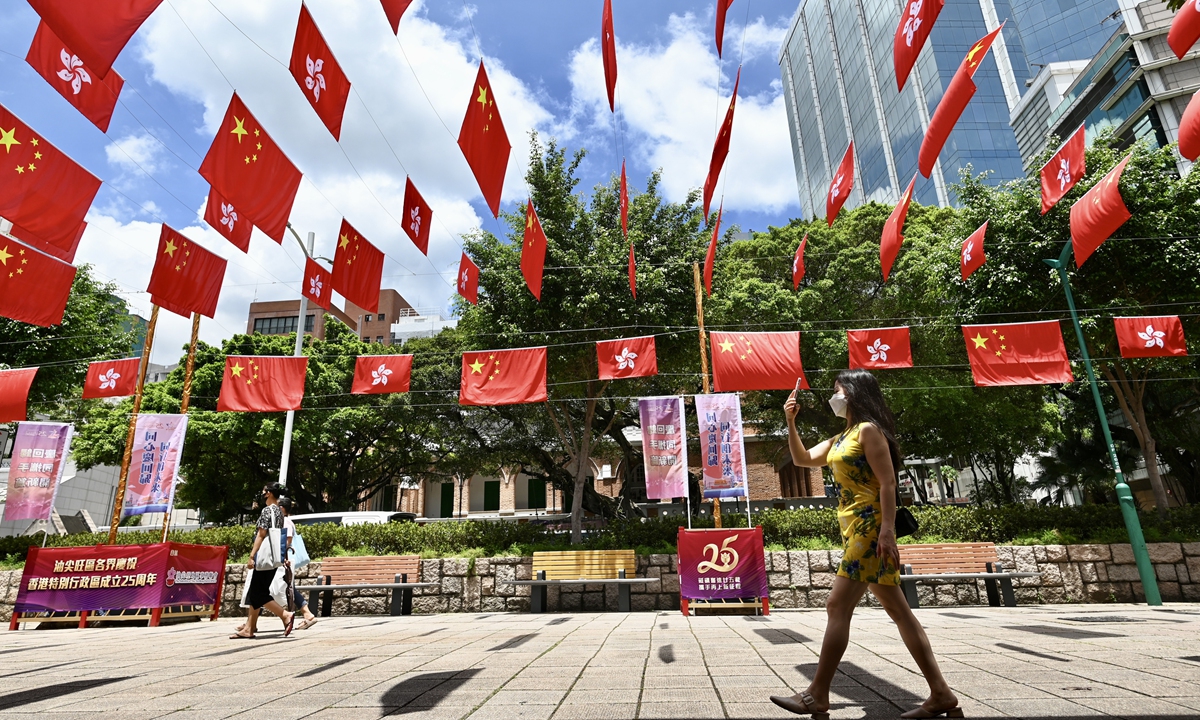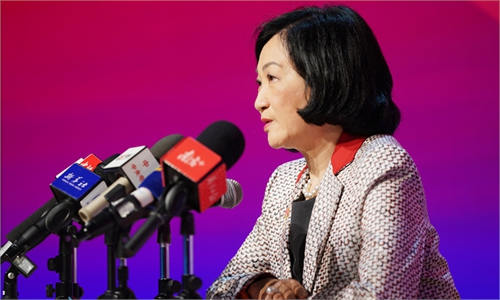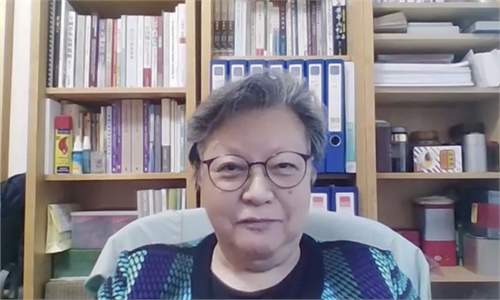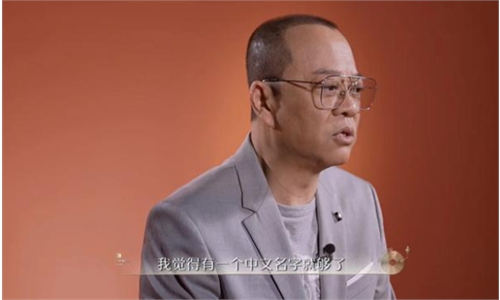
China's national flag and the flag of Hong Kong Special Administrative Region hanging over the streets in Hong Kong on June 17, 2022 Photo: VCG
After weathering riots and the onslaught of COVID-19, Hong Kong, a city which ushered in a new social and political environment, is set to welcome the 25th anniversary of city's return to the motherland. Many Western media took opportunity to play up the negative, yet twisted narratives about Hong Kong's development after the handover. Such an attempt was seen by observers as a "sour grapes" mentality of Western forces, trying to shadow the much-anticipated anniversary, as well as the city's booming future.
Chinese experts believe such malicious hype of so-called "betrayal" of "one country, two systems;" "eroding" Hong Kong's democracy, and the city's "dim future" only came after Western forces failed to damage Hong Kong's system and stop the city from moving forward to a bright future. The city's luster as the "Pearl of the Orient" will never be overshadowed by Western slander.
In an article published by the Associated Press titled "Hong Kong in limbo 25 years after British handover to China," it said that "Beijing has been expanding its influence and control," and that those moves appeared to be hastened by riots in 2014 and 2019. It also claimed the city's electoral reform, and freedom of the press has come "under attack."
An article from AFP headlined "A promise kept or betrayal? Hong Kong 25 years on from handover" also seemed to imply that the "one country, two systems" has gone against the direction "promised a high degree of autonomy, independent judicial power, and that the city's leader would be appointed by Beijing on the basis of local elections or consultations."
In response to the criticism of the West and accusations against Beijing for so-called damage to the "one country, two systems" principle, Rita Fan Hsu Lai-tai, the president of the first-term Legislative Council after the city returned to the motherland, recalled the social turmoil in 2019, saying that the accusations stemmed from Western forces' interference in China's internal affairs.
They [Western forces] failed to damage the "one country, two systems" but they did not want to admit that so they shifted the blame to us, accusing us of not following the rules of the game, she told the Global Times.
The "one country, two systems" means that in one country, there are two different systems under which Hong Kong can practice capitalism, which has never been changed. Capital or assets can flow in and out of the city with no limitations, Fan said.
When the black-clad violence and riots broke the peace and stability of Hong Kong, "there was no so-called system anymore, and that the situation made the central government roll out measures," she said, noting that the National People's Congress formulated the law to safeguard national security, which helped restore stability. "This was the situation that the Western forces did not want to see. That's why they play the trick of accusing us of damaging the 'one country, two systems' principle."
In response to some claims that Hong Kong now has only one voice and the way of governing the city is much like that in the mainland, Fan refuted those claims, saying that the opposition groups still exist, but there's no "laam chau" anymore.
The term "laam chau" was commonly used by anti-government protests in the social turmoil in 2019. "Laam chau" was pushing the city into destruction with the aim of threatening the central government. The opposition groups did not agree to certain measures adopted by the government, but it's not the opposition groups' patent to bring up their opinions to the government. "The pro-establishment groups in Hong Kong can do it, too," Fan said.
Another reckless claim is China has walked back from the Sino-British Joint Declaration. In the AFP article, it said that "China has ripped up the joint declaration and is vengefully and comprehensively trying to remove the freedoms of Hong Kong because it regards them as a threat."
In an interview with the Global Times, Lau Siu-kai, deputy head of the Chinese Association of Hong Kong and Macao Studies, believes this reflected a misconception in the West, which is to believe the joint declaration remains effective after Hong Kong returned to motherland. Lau said the claim lacks a legal basis.
"The Constitution is the legal basis of "one country, two systems" and Basic Law, not the joint declaration. The central government made the Basic Law for HKSAR according to the Constitution; second, the central government established the HKSAR in accordance with Article 31 of the Constitution. The two principles not only were regulated in the Constitution, but were also included in the joint declaration," Lau explained.
Luster remains
In recent years, Hong Kong has suffered consequences of not only the riots, but also COVID-19, during which many businesses were bruised. In an AP article it noted that Hong Kong's "luster as a global hub has faded." It cited government statistics saying that Hong Kong lost nearly 90,000 of its 7.5 million population in 2021, more than 100,000 people left in February and March this year, during the city's worst COVID wave.
Hong Kong people's "identity crisis" and "despair" also became a focal topic of Western media hype. The BBC interviewed Hong Kong people currently living in the UK to vent their dissatisfaction.
Lau admitted there's a need to emphasize a "return of people's hearts" in Hong Kong's future. He explained that unlike other former colonies, the central government did not prioritize working on an ideological level for a long period since 1997, the purpose of stabilizing human hearts. Yet hostile forces inside and outside of the city invested vastly in this "territory," especially in education and media. Lau said those forces tend to create a "Hong Konger" identity that is at odds with "Chinese."
He believes the HKSAR government should focus on this territory in the next stage, as after the national security law took effect, and electoral reform, the work of "returning human hearts" has won powerful legal and systematic support, which swept the obstacles for future implementation.
Experts also warned the city will face an unprecedented hostile external environment and a challenging internal situation. The US has upped the ante of cracking down on China, and the previous development opportunity and "special treatment" Hong Kong gained from the West will be gradually taken away, Lau said, noting that the West will exert harsher and a more frequent crackdown and sanctions on Hong Kong.
Under such circumstances, he suggested Hong Kong must find its new position, to engage in the country's development plan, strengthen its economic connection with Asian countries, especially Southeast Asian countries, actively participate in the Belt and Road Initiative to gain wider development space and more momentum for economic and industrial growth.
In an exclusive interview with Xinhua News Agency in May, John Lee, the newly appointed sixth-term chief executive of the Hong Kong Special Administrative Region (HKSAR), also said an important mission will be promoting Hong Kong's full integration into the overall development of the country and in-depth participation in the development of the Guangdong-Hong Kong-Macao Greater Bay Area.
Yet Regina Ip Lau Suk-yee, the chairperson of the New People's Party, who was also appointed recently as convener of the Executive Council (ExCo) meeting of the HKSAR, is positive about Hong Kong's prospects. Hong Kong's status as a global financial center and international shipping center may be challenged in the past few years, yet those challenges are temporary.
In the long run, Hong Kong is still endowed with attractive conditions, international appeal, said Ip, noting that its diverse society with a high degree of internationalization makes Hong Kong continue serving as a bridge between East and West. "It's not a problem that some are leaving, what's important is people keep coming."



